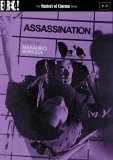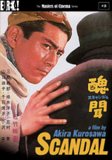 Assassination | DVD | (23/01/2006)
from £19.99
| Saving you £N/A (N/A%)
| RRP
Assassination | DVD | (23/01/2006)
from £19.99
| Saving you £N/A (N/A%)
| RRP Assassination (or Ansatsu) marked Masahiro Shinoda's first attempt at a period film and is widely considered to be his finest achievement. Previously gaining fame and status alongside Nagisa Oshima and Kiju Yoshida challenging established Japanese cinema with tales of reckless youth The Dry Lake (1960) and the seminal yakuza drama Pale Flower (1964) Shinoda graduated from Shochiku where like Shohei Imamura his grounding wa
 Scandal | DVD | (14/11/2005)
from £5.54
| Saving you £14.45 (72.30%)
| RRP
Scandal | DVD | (14/11/2005)
from £5.54
| Saving you £14.45 (72.30%)
| RRP On holiday in the snow-covered mountains young painter Ichiro Aoye (Toshiro Mifune) has a chance meeting with the popular singer Miyako Saijo (Shirley Yamaguchi). After giving her a ride back to the hotel where they are both staying Ichiro is photographed with Miyako by paparazzi. A magazine creates an expos of their 'secret romance' based around this photograph and the brooding Ichiro ignites a bitter and dirty libel case in order to restore their honour... Akira Kurosawa's
![Illusion Of Blood [1996]](/pictures/1006076.jpg) Illusion Of Blood | DVD | (02/02/2003)
from £N/A
| Saving you £N/A (N/A%)
| RRP
Illusion Of Blood | DVD | (02/02/2003)
from £N/A
| Saving you £N/A (N/A%)
| RRP From Shiro Toyoda director of the nightmarish Portrait Of Hell comes a chilling story of love betrayal and vengeance. Tatsuya Nakadai stars as the selfish samurai Iyemon who after the loss of his lord has been left impoverished. He become outraged that his father-in-law intends to sell his two daughter's into prostitution. It is not love but respectability that Iyemon desires...
![Ugetsu Monogatari [Masters of Cinema] (Dual Format Edition) [Blu-ray]](/pictures/1113975.jpg) Ugetsu Monogatari | Blu Ray | (23/04/2012)
from £N/A
| Saving you £N/A (N/A%)
| RRP
Ugetsu Monogatari | Blu Ray | (23/04/2012)
from £N/A
| Saving you £N/A (N/A%)
| RRP Mizoguchi's Ugetsu Monogatari [Tales of the Rain and Moon, aka Ugetsu] is a highly acclaimed masterwork of Japanese cinema. Based on a pair of 18th century ghost stories by Ueda Akinari, the film's release continued Mizoguchi's introduction to the West, where it was nominated for an Oscar and won the the Venice Film Festival's Silver Lion award (for Best Direction). In 16th century Japan, amidst the pandemonium of civil war, potter Genjuro (Mori Masayuki) and samurai-aspirant Tobei (Ozawa Sakae) set out with their wives in search of wealth and military glory respectively. Two parallel tales ensue when the men are lured from their wives: Genjuro by the ghostly charm of Lady Wakasa (Kyo Machiko); Tobei by the dream of military glory. Famed for its meticulously orchestrated long takes and its subtle blending of realistic period reconstruction and lyrical supernaturalism, Ugetsu Monogatari is an intensely poetic tragedy that consistently features on polls of the best films ever made.
![Kisses [2007]](/pictures/1070951.jpg) Kisses | DVD | (23/07/2007)
from £24.99
| Saving you £-5.00 (N/A%)
| RRP
Kisses | DVD | (23/07/2007)
from £24.99
| Saving you £-5.00 (N/A%)
| RRP Masmura's debut feature with its stripped down narrative and handheld camerawork sent a shock wave through Japanese cinema in much the same manner as Godard in Europe. With its liberated camera and even more liberated protagonists this is the film which caused Oshima to say of Masumura ""a powerful irresistible force has arrived in Japanese Cinema."" A young boy and girl meet while visiting their respective fathers in prison. The young lovers soon embrace both each other and their mu
![Musashi Miyamoto [1955]](/pictures/1003988.jpg) Musashi Miyamoto | DVD | (21/05/2001)
from £N/A
| Saving you £N/A (N/A%)
| RRP
Musashi Miyamoto | DVD | (21/05/2001)
from £N/A
| Saving you £N/A (N/A%)
| RRP The Samurai Trilogy is based around the life of the historical character Musashi Miyamoto. Born around 1584 he perfected the technique of two sword fighting as well as developing into a considerable Zen black ink artist. Having fought his first duel at the age of thirteen he was involved in 60 other engagements before his death in 1645. Several versions of his life have been produced for cinema and television in Japan but none more prestigious than Inagaki's Samurai Trilogy. Winner of the Academy Award for Best Foreign Language Film in 1955 it was also Toho's first foray into colour. The first episode of the trilogy covers Miyamoto's formative years as he emerges from rural obscurity to search for fame and glory in civil war but returns home a broken man. Brought back to sanity through the love of a warm hearted girl she persuades him to place himself under the spiritual guidance of an unorthodox Buddhist priest. His methods of teaching the ways of enlightenment would make the fiercest of Zen masters seem positively gentle. Gaining in spiritual stature and insight Miyamoto is forced to choose between settling for domestic happiness or continuing his search for perfection in the art of the sword.
![Fukasaku Trilogy [1968]](/pictures/1081543.jpg) Fukasaku Trilogy | DVD | (23/06/2008)
from £27.00
| Saving you £-7.01 (N/A%)
| RRP
Fukasaku Trilogy | DVD | (23/06/2008)
from £27.00
| Saving you £-7.01 (N/A%)
| RRP The breakout success of the fantastic Battle Royale resulted in long-overdue global recognition of the films of Kinji Fukasaku. This prolific Japanese filmmaker who died in 2003 had already made himself a name in his home country as an auteur who favoured outrageous style and biting social commentary. This collection brings together three exciting and colourful early films from Japanese cinema's most exhilarating director. Titles Comprise: Blackmail Is My Life: Tautly paced and fueled by a trendy soundtrack synthesis of whistled themes and electric rock Blackmail Is My Life centers on a quartet of young daredevil hipsters who discover blackmail as a means to enjoy the booming economy from which they've been excluded. These rebellious youths tread a deadly line by blackmailing both sides of society- namely the Yakuza kingpins and top government officials. Blackmail Is My Life is a bloody wake-up call to Japanese culture and budding criminals and a perfect example of the director working in his prime. Black Rose Mansion: A feverishly perverse 1969 film noir oddity starring female impersonator Akihiro Maruyama. When wealthy Kyohei hires singer Black Rose to perform in his exclusive men's club he gets more than he bargains for when she attracts scores of homicidal past lovers. The film takes a bizarre twist when Kyohei's son falls victim to the femme fatale's unique charm. If You Were Young: If You Were Young highlights the other side of post-war Japanese prosperity focusing on the throngs of young people who missed out on the boom. We follow a group of young men that can't seem to get ahead despite their willingness to try. Then one hits upon a plan - to work together to save for a dump truck and thus become independent contractors and be their own bosses at last. Ultimately life presents obstacles: jail for one violence at the hands of the police for another and a girlfriend and subsequent children for the third. An early Kinji Fukasaku gem that imports the freewheeling style of the French New Wave and the hip detachment of American noir.
![Black Rose Mansion [2007]](/pictures/1072265.jpg) Black Rose Mansion | DVD | (27/08/2007)
from £N/A
| Saving you £N/A (N/A%)
| RRP
Black Rose Mansion | DVD | (27/08/2007)
from £N/A
| Saving you £N/A (N/A%)
| RRP Famous female impersonator/singer Akihiro Maruyama fresh from success in Kinji Fukasaku's baroquely psychedelic Black Lizard returns in this feverishly perverse campy follow-up. Wealthy Kyohei (Eitaro Ozawa-A Taxing Woman the H-Man) installs songbird Black Rose (Maruyama) in his elegant private men's club to bolster business-but Kyohei gets more than he bargained for when she attracts scores of homicidal past lovers and not only he but his ne'er-do-well son (Masakazu Tamura) end up falling for the femme fatale.

Please wait. Loading...
This site uses cookies.
More details in our privacy policy